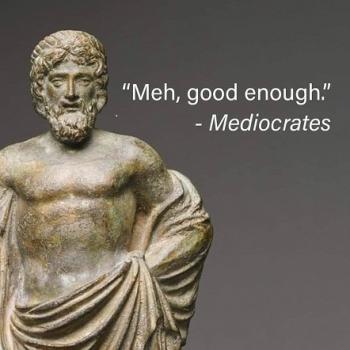It took Bill Clinton to put the silly Innocence of Muslims video in context, and usefully frame the supposed reaction to it in the Islamic world. In an interview with CBS on September 25, the former president said this:
We weren't disrespecting Islam by not squelching a film trailer . . .
[Y]ou can't react every time you're insulted . . .
If you live in a shame-based society where you think nothing good's gonna happen, the temptation is to wait for somebody to say something you'd find offensive and you can lash out against it. But free people absorb destructive things and refuse to be destroyed . . .
You cannot live in a shame-based world. You won't make it in the 21st century. There's too much diversity. There's too much stuff goin' on the internet. You gotta be able to say, if you believe in Islam, that, 'I believe in a god and a prophet strong enough to withstand the criticisms of petty, narrow-minded, mean-spirited people. I believe that the cultural crassness I abhor will, in the end, fall before the values that I exalt.'
Clinton put his finger on the central issue here, which is that being on the watch for offense, and cultivating elaborate ways of reacting to it, is a self-destructive lifestyle. Governments and laws should not adjust themselves to this mode of life, because it does nothing good. Instead, it fans the flames of evil. In its worst incarnations, such as the social dynamics of rival gangs, it leads to the constant pursuit of revenge for instances of "disrespect," real or imagined. I call this the "cycle of diss," and it is inevitably a downward spiral, feeding lives and hopes into the maw of an evil that is never satisfied. The premise of revenge against disrespect is unrequitable. No amount of revenge and counter-revenge is ever "enough."
Throughout history, the young men of different societies, in certain times and places, have organized themselves around the principles of shame and revenge. This has rarely lasted long, because it is negative, destructive, and unsustainable. Criminal syndicates manage to keep this way of life going across generations, but they produce nothing of value and their whole purpose is to batten on the weaknesses of others. There is no positive model of life, individual or societal, in which brooding over perceived slights and seeking punishment for them have made a contribution. The shame-revenge impulse is a detractor and destroyer, contributing nothing.
None of this is to broadly associate Islam or Muslims with a shame-revenge model. But Mohammed Morsi, the new president of Egypt who has demanded that the United States punish the producer of the video, can be associated with it (as can the Egyptian prosecutors who referred for a blasphemy trial an Egyptian who ripped up the Bible during the Cairo protests in mid-September). Rioters-on-demand who stated that their motivation was the video can also be associated with it. In demanding retribution for perceived slights to Muhammad (or "heavenly religions"), the point is not that they have signaled something about Islam but that they have appealed to a vicious, downward-spiraling basis for social organization and law.
Insults and vengeance occupy our human thoughts often, but the Bible says relatively little about them. Jesus told us to forgive, promptly and absolutely (Mt. 18:21-35), and God reserves vengeance for Himself (Rom. 12:1;, Dt. 32:35). Vindication of God's people—or of His own glory—can't come through our efforts to punish or silence others. God simply tells us this, and requires us to take it on faith; He doesn't elaborate or dwell on the matter.
Indeed, the faith we have that He is watching over us in spite of insults and slanders from others is one of the great personal interactions we have with God. No formula is laid out for us in the Bible, nothing to describe scenarios and tell us exactly what to do in specific situations. Shaking off offense and rejecting vengeance require an absolute and principled dependence on God, one in which each instance is worked out between Him and the believer. In forgiving insults without complaining or making excuses because of circumstances, we are standing before God and His hosts, putting our own stamp on obedience to one of His least-detailed instructions, and doing Him honor in the process.
We would be making a grave error to interpose men and laws in this equation. Indeed, too much of Christian history shows us the ugly result of that very error. Over time, we came to understand that earthly government is ineligible, through its inherent human flaws, to wield the power of defining what is offensive to religious believers and setting punishments for it. It works best for the state to behave as if the people can and should overlook foolish "insults."





